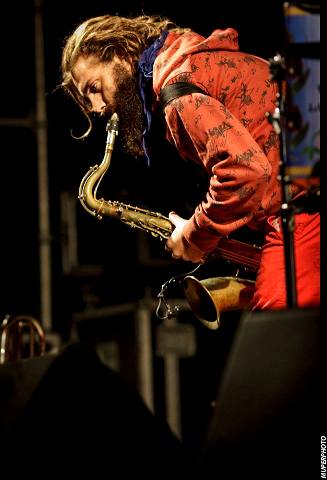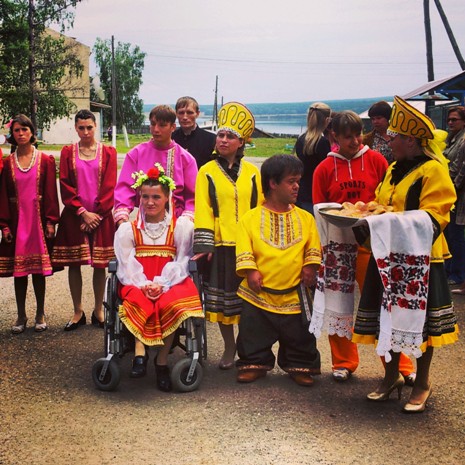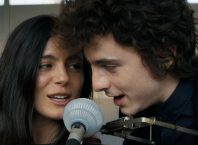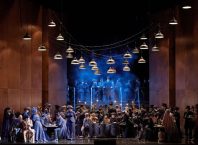I think that if the devil met Eyal Talmudi at the crossroads, the devil might just walk away, feeling that he doesn’t have much to offer. Talmudi plays with astounding intensity and wild sensitivity, breathing life and fire into the instruments. Whether on clarinet, saxophone or bagpipes, he makes you feel as though the music has always been there, and will go on forever, an ever-changing moment that draws the listener into an endless dance.

The in-demand musician is an active member of Balkan Beat Box, a regular guest of Berry Sakharof and Boom Pam, and welcome on many stages, but his two main musical projects are Oy Division and Malox, which will both be featured in the upcoming International Exposure for Israeli Music. Onstage or jumping into the audience, Talmudi is a phenomenon, large, loud, and knowing no boundaries. Meeting him for the first time in person, his long hair tucked neatly into a knit hat, all that energy is diverted into his conversation, which flows like the music, with quiet riffs and complex digressions, all drawing on a deep love and knowledge of music.
Oy Division
Talmudi is a co-founder of Oy Division, whose members are: his brother Assaf Talmudi (accordion); Noam Inbar (vocals, accordion and drum); Avichai Tuchman (double bass); Gershon Leizersohn (violin and vocals); and Eyal (clarinet and vocals). Singing in Yiddish or Russian, Oy Division plays Klezmer as if these Jewish folk songs were written today, with punk neshama gets the room dancing.
“One of the things that interests me in Oy Division is the connection to folkore,” said Eyal, his blue eyes speaking volumes as he added, “it’s obvious, I’m Polish, the son of European Jews, this is totally my music, it’s where I’m from…not that my parents listened to Klezmer all day long. My connection to folk music is always strong: I love it, I’m always listening to it, and musically it’s fascinating. It’s like learning a language it’s always the same structure, but the accent changes. When I play Moroccan music the structure is very similar (to Klezmer), but what interests me is the connection to music that has no composer.”
Talmudi is a musician of extremes, comfortable with contradictions. He enjoys the immense freedom offered by folk music, where the composer is often unknown, giving him the opportunity to play the song as he feels it should be played. Yet at the same time, he feels strongly about the way folk music connects him to others.
“Meeting people around the world, performing with them at Klezmer festivals around the world, just like in the jazz scene, there is a certain repertoire that everyone knows, and even if they don’t know it, they can still play their own version on the spot. From my perspective that is the essence of folk music because it plays to people and not to the industry. Oy Division has been all over the world with this music, we were in South American and South East Asia, in every place in America and in Europe, and there is a connection to people, not necessarily to Jewish folklore or any specific folk culture. The connection is through music that is simple, but it’s more complex than pop… it’s actually kind of a very old form of pop music from a different era.”
“When we approach this music, we try to make it as extreme as we can, even though it’s very acoustic – no drums, no electronica – we want to bring the feel of Punk, so you feel that you’ve never heard this song performed this way before, more extreme, faster, or slower… that’s what it’s about.”
“Singing in Yiddish in Israel,” says Eyal, “a language which most people don’t understand in Israel and don’t understand in other countries, it’s a like Punk – playing really loud and shouting: people don’t understand the text. It’s like shouting an important message, mumbling words into the mic, the message is strong and it emerges in anger and with great intention, but we don’t know if anyone will understand it.”
“The texts are really old, and talk about the every day events of life, whether it’s a boy who has been taken from his home to the war or returning from the war and getting married or a wedding in the shtetl where the rabbi takes out a pork loin…”

If we can make people happy and make them think twice…
Usually in concerts, Eyal’s brother Assaf will introduce the songs and tell the stories, which often sound incredible. When asked if these descriptions are accurate, Eyal confirmed that Assaf does not embellish on the lyrics, it’s all there, in Yiddish or Russian.
“Yes, we love the bizarre,” Eyal said, “that’s true, but what is absurd is that is just the way it is… someone wrote this song Fin Der Shtib – they took me from my home to some war… my brother always introduces this song by asking: Who won the war between Russia and Japan? He even offers a prize, and people just sit there. They don’t know, and they are embarrassed, too embarrassed even to guess. Hey, says my brother, there are only two options here… and what does it show? That there was this hysteric war, so many people died… and no one even remembers who won. It’s not important. It wasn’t important then, and it’s not important now, what is important, what endures, is this man who was taken at age 12 to fight for the Tsar. They took him from his home to the front, to fight a war that he doesn’t know why he’s fighting or who he’s fighting against… it’s still relevant, it’s still happening now.”
Oy Division has just completed a long tour with Psoy Koralenko, with whom they recorded their latest album Dicunt. “Psoy brought these texts, he’s really a man of words and philosophy,” said Eyal, “He takes a song that is the most Jewish niggun and adds a rap in Russian that completely changes the meaning. In another, a Russian prison song from the late 70s, Gody Mchatsya, we realized in rehearsal that it’s the original version of a song sung by Boaz Sharabi – Etzli Hakol Beseder (Everything’s fine) from the soundtrack of the film Me’Ahorei Hasoragim (1984). It’s the most Israeli song, the most cult… you see a lot of that in Israeli folk, the idea that everything was invented here. This is the message of Oy Division, that Jews have lived everywhere, the world is wide, and in terms of being super-Israeli and hyper-patriotic, well…”
The recording by Oy Division joins both the Russian and Hebrew versions of the song, reflecting the band’s message of music that transcends national, linguistic and cultural borders, speaking to everyone. Listening closely to Oy Division’s repertoire, one detects a message of social and political critique in the songs. Eyal expressed this message, saying, “We’re not enthusiastic about what’s happening here…you know, if we can make people happy and make them think twice before they… about how they vote, and how they live, what they do and to whom they are accountable, then that’s where we are…that’s Oy Division.”
A life-changing experience

Traveling with his music, Eyal remains very open to experience, and was visibly moved by a recent tour in Siberia where Oy Division performed at the opening ceremony of the International Kansk Video Festival, a five hour flight away from Moscow, and then some.
“It’s sort of an anti-Cannes… we performed with Psoy and a local ensemble who sang in Yiddish. I don’t know how long it’s been since people heard Yiddish there. They took us around, we saw the Taiga Forest… it puts things in proportion… the people who live there have nothing. They can’t leave, not because there’s some government restricting their movement, but because they don’t have money for gas or for a plane ticket. It was very important to the organizers that the participants get a sense of the place, they took us to a neuro-psychiatric institution about two and a half hours away from Kansk… fucking end of the world. The people there met us in traditional dress, and the children sang for us, they were so welcoming. I’ve seen my share of institutions, usually you feel so sorry for the people there, but here they had this amazing landscape and people were walking freely on the grounds, one person was making sculptures… there was a good feeling, it was very moving… a life-changing experience.”
Malox
Malox, like Oy Division, is a project Eyal founded about seven years ago, together with drummer Haggai Fershtman. The two knew one another but had never recorded together, until they found themselves in New York, each with different gigs, and each with a free day. They spent that day in a recording studio, and the result was One Day – Malox’s first album.
How did Malox evolve? Eyal located its origins in the internal contradictions of his personality, saying, “I love everything avant garde, abstract, free, and then at a later age, like with Balkan, I got into jumping and making people dance. I started listening to free jazz as a teenager, partly because of my brother who was already in high school. I studied at Thelma Yellin, and switched to the sax when I began feeling that the clarinet was a bit too classical for me. At Thelma Yellin students listen to classic jazz and feel that it’s cool to be niggers from the 60s, wanting to play blues as if you’re black… me too. They listen to Dexter Gordon, Coleman Hawkins … but at age 14, 15 I was up at night listening to David Murray and Hamiet Bluiett. It was only when I was 16 or 17 that I started listening to David Bowie and things that were more standard.”
His older brother got him into the musical mainstream playing on production gigs with musicians such as Shlomi Shaban and Yermi Kaplan from the time Eyal was 18. Eyal recalled how he first began playing with Berry Sakharof, “He heard me play at Hagada Hasmalit (the legendary Tel Aviv alternative venue), turning buttons, making loops, and then I get a call from this god and he says – I want you to do your thing in my concerts. I asked him: What do you mean? He said: I want you to bring whatever you want, and do whatever you want. and this is Berry…this is his genius. All the musicians he works with would do whatever he asks, but he would never tell them what to do.”
As for Malox, Eyal said, “Malox is my baby, it’s the project closest to my heart. It happened after years of searching, bringing together the extremes of free jazz, folk and pop. It’s all concentrated into a love for minimalism and noise.”
The name Malox refers to a popular medication for heartburn, Eyal originally wanted to name the explosive duo ‘heartburn’ but Haggai Fershtman persuaded him otherwise. The two recorded a second album, Polka For Punks just one year ago, in October 2012. Malox now has a new young drummer Roy Chen, and together they play everything from “the most open hard core free jazz” to the simple fun of Popcorn. Enjoy this most recent video by Michal Gutmann from InDNegev 2013.
“Malox is what I love to do most, Malox is wilder. I like to play very intensively, to fill the space… other musicians don’t always feel comfortable with that. With all the respect for Klezmer and Jewish folklore, I’m not just about that… African music, jazz… all folk music is music of the people, for people.”
Malox will be performing on the opening night of the International Exposure Jazz weekend at the Yellow Submarine in Jerusalem, and Oy Division will be performing on the closing night at The Zone in Tel Aviv. Check the Yellow Submarine facebook page for the full program.
Hear Malox on October 26th at Para Pub, November 21st at Habeer Zeelim and later that month in Poland and the Czech Republic. Keep up with Malox here and here. Oy Division updates here.





